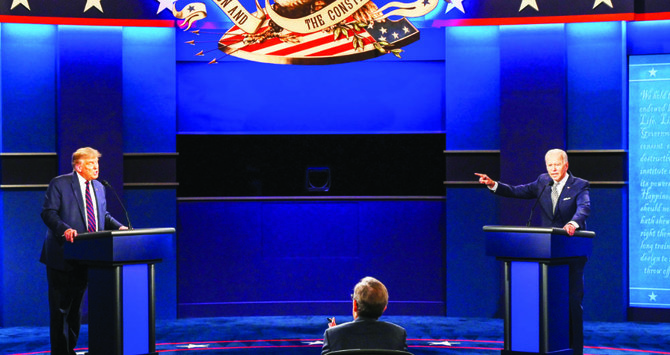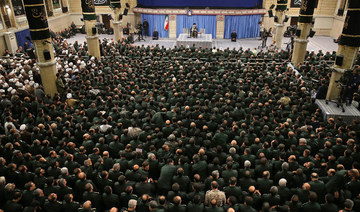BEIRUT: Barack Obama, the former US president, left the Middle East in far worse shape than when he assumed office in 2009, according to about 53 percent of respondents in a pan-Arab poll conducted by YouGov for Arab News.
With this in mind, you might expect Arabs to broadly favor Republican candidate Donald Trump over his Democratic rival Joe Biden in the upcoming presidential election on Nov. 3.
Yet the Arab News/YouGov survey found Biden would be better for the region with 40 percent, against 12 percent who said Trump would be good for the region. That said, some 49 percent said neither candidate would be good for the Arab world.
However, as Obama’s vice president, some observers wonder whether a victorious Biden would simply pick up where his old boss left off. This is a particular concern for those who want to see a tough US stance on Iran.
Indeed, it was during Obama’s second term that the US signed the Joint Comprehensive Plan of Action (JCPOA), known as the Iran nuclear deal, offering Tehran sanctions relief in exchange for abandoning its ambitions to build a bomb.

Trump, who is up for re-election, withdrew the US from the deal in May 2018, reimposing a raft of crippling sanctions on Iran. With European signatories fighting to salvage the landmark accord, Biden could conceivably turn back the clock.
Some 35 percent of Arabs polled in the Arab News/YouGov survey said they believe the US withdrawal from the JCPOA had a negative impact on the Middle East. Residents of Iraq, Lebanon and Saudi Arabia were most likely to say the withdrawal and increased sanctions have made the region safer.
“There’s no question that the Iran nuclear deal failed to block the Iranian regime’s path to nuclear weapons,” said Ali Safavi, an official with the Foreign Affairs Committee of the Paris-based National Council of Resistance of Iran (NCRI).
“Indeed, the regime took the billions the JCPOA provided and propped up the criminal regime in Syria, armed and funded the terrorist Hezbollah in Lebanon, the terrorist Shiite militias in Iraq and the Houthis in Yemen.”
For Safavi and his NCRI colleagues, the only effective policy is one that exerts “maximum pressure” on the regime in Tehran and “holds it to account for its countless human rights violations.”
It appears his skepticism is widely shared. Now critics of the JCPOA want to know whether Biden is prepared to dispense with his Obama-era baggage. “Iran is the key issue in understanding much of the Arab world’s bad aftertaste of the Obama administration,” David Romano, Thomas G. Strong Professor of Middle East Politics at Missouri State University, told Arab News.
“They know that the Obama-Biden administration gave Iran a free pass on all kinds of nefarious activities in the region in order to coax them into the nuclear agreement.”
Mindful of Tehran’s perceived malfeasance, about 58 percent of Arabs polled want Biden to distance himself from Obama’s hands-off approach to Iran and instead tackle the problem head-on.
Simultaneously, Arabs want the US to maintain its tough stance on Iran, even if they are divided over what strategy Washington should employ, according to the Arab News/YouGov survey.
READ: The methodology behind the Arab News/YouGov Pan-Arab Survey
Respondents in Iraq, Saudi Arabia and Yemen, which are willy-nilly intimately tied to Iran, were especially in favor of a tough line. Asked what strategy the next US president should take in future dealings with Iran, a large proportion — 53 percent in Iraq, 49 percent in Saudi Arabia and 54 percent in Yemen — favored maintaining strict sanctions and a war-like posture.
Dr. Majid Rafizadeh, an Iranian-American political scientist and president of the International American Council, says it is understandable that many in the region view the prospect of a Joe Biden presidency with some unease.
“A reversion to any form of acceptance of the Iranian regime’s regional policy or sending ‘plane loads of cash’ to Tehran risks undermining peace in the Middle East,” he told Arab News. “Both presidential candidates must look to build on the good work of the Abraham Accords in fighting back against this narrative.”
While the Arab world overall is split on the potential impact of the killing in January by the US of Qassem Soleimani, head of the Iran’s extraterritorial Quds Force, the geographic differences highlighted by the Arab News/YouGov survey are perhaps more significant.
People living in Yemen, Saudi Arabia and Iraq were very supportive, with respectively 71, percent, 68 percent and 57 percent viewing it as a positive move for the region. In contrast, 59 percent of respondents in Lebanon and 62 percent in Qatar said it was a negative move for the region.
“The poll accurately assesses the interests of Arab states,” said Dr. John Hulsman, president and managing partner of John C. Hulsman Enterprises, a prominent global political risk consultancy.
That said, one factor the Arab world must not underestimate, according to Hulsman, is the depth of the desire among American leaders of all political stripes to find an exit from the Middle East and pivot elsewhere.
“Oddly enough, despite Obama and Trump being the two least likely people in the world to share any commonalities at all, they do have a similar view of the Middle East, and that is ‘let’s get out,’” he told Arab News.
“We have had presidencies destroyed (over the US presence in the region) and there is no benefit to staying in. We have overestimated the importance of the region. All the risk and reward, all the future global growth — that all lies in Asia now.”
For Hulsman, the real challenge for whoever wins the election is how to disengage from the region while retaining some semblance of stability.

Significantly, Iran figures high on the list of what Arabs think are the greatest threats facing the US, according to the Arab News/YouGov survey. It occupied third place, after white nationalism and China.
Despite their concerns about Iran’s malign influence in their own neighborhood, why did not more than 9 percent feel Tehran poses a bigger threat to Washington than China? “It shows that the typical Arab is not convinced that the US is on his side when it comes to Iran,” Khalil Jahshan, executive director of the Washington DC-based Arab Center, told Arab News.
Although Biden has branded Trump’s “maximum pressure” campaign on Iran a failure, there are scant clues as to what line he might take should he assume office, leaving Arab leaders guessing.
This uncertainty is reflected in the Arab News/YouGov pan-Arab survey, with the largest proportion of Arab respondents rejecting both Trump and Biden. For critics such as Safavi, it makes little difference who wins unless the US is prepared to come down hard.
“Irrespective of the outcome of the election, the experience of the past four decades has made it palpably clear that no amount of political and economic concessions will result in change in the behavior of the theocracy that has ruled Iran with an iron fist,” Safavi said.
Twitter: @rebeccaaproctor






























